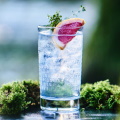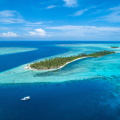
Emporio Armani launches a casualwear capsule collection of trench coats, blousons, T-shirts, button-down shirts, shorts and pullovers made of sustainable material. The packaging is certified compostable.
By Isabelle Brigout on Thursday 24 March 2022, 06:20 - Ethical shopping

Emporio Armani launches a casualwear capsule collection of trench coats, blousons, T-shirts, button-down shirts, shorts and pullovers made of sustainable material. The packaging is certified compostable.
By Isabelle Brigout on Thursday 10 March 2022, 06:00 - Ethical shopping

Globe Trotter has launched a collection of sustainable luggage and briefcase inspired by the ones owned by Daniel Craig in the last James Bond No Time to Die, released end of 2021 in the United Kingdom and in the United States.
By Isabelle Brigout on Monday 21 February 2022, 06:24 - Green hotels
 Integrity and respect for the environment have inspired the philosophy of the gastronomical restaurant Terra, around which the boutique hotel has been built. Terra is the highest-lying Michelin starred restaurant in all of Italy.
Integrity and respect for the environment have inspired the philosophy of the gastronomical restaurant Terra, around which the boutique hotel has been built. Terra is the highest-lying Michelin starred restaurant in all of Italy.
By Isabelle Brigout on Thursday 10 February 2022, 06:38 - Ethical shopping

Karine and Stéphanie Coccellato have launched a user friendly vegan skincare line in 2018, specifically developed for men.
By Isabelle Brigout on Monday 31 January 2022, 06:37 - Concierge
 Sky Lagoon is located along a lagoon where water is naturally heated: the open-sky bath is offered in the lagoon and the energy needed to heat the building is from renewable origin.
Sky Lagoon is located along a lagoon where water is naturally heated: the open-sky bath is offered in the lagoon and the energy needed to heat the building is from renewable origin.
By Isabelle Brigout on Monday 10 January 2022, 07:42 - Organic food

The Botanist gin is a fully natural gin made from endemic plants from the Inner Hebrides, off Scotland.
By Isabelle Brigout on Monday 3 January 2022, 05:26 - Green hotels
 The atoll of Laamu, on which is settled the Six Senses resort has been declared Hope Spot by Mission Blue, founded by the American oceanographer Dr. Sylvia Earle. The international non-profit organization aims to help to the protection of at least 30% of the surface of the oceans by 2030, whereas it was only 1% in 2009.
The atoll of Laamu, on which is settled the Six Senses resort has been declared Hope Spot by Mission Blue, founded by the American oceanographer Dr. Sylvia Earle. The international non-profit organization aims to help to the protection of at least 30% of the surface of the oceans by 2030, whereas it was only 1% in 2009.